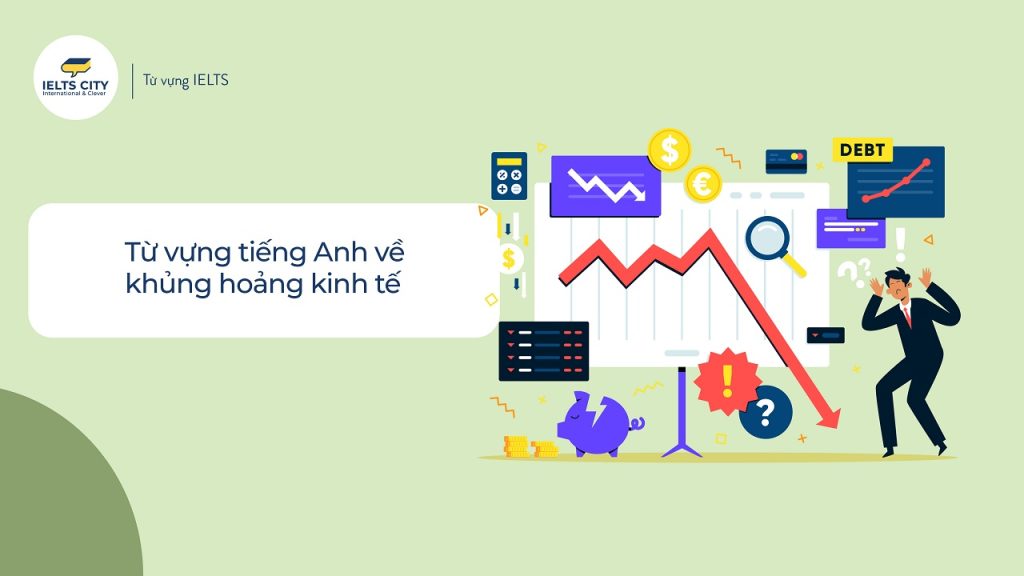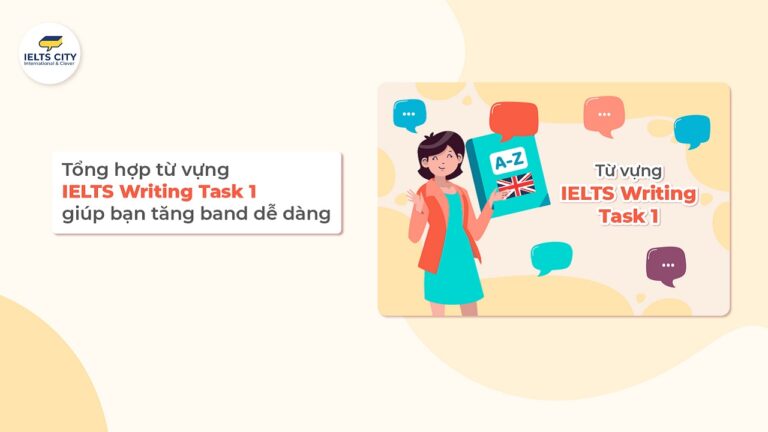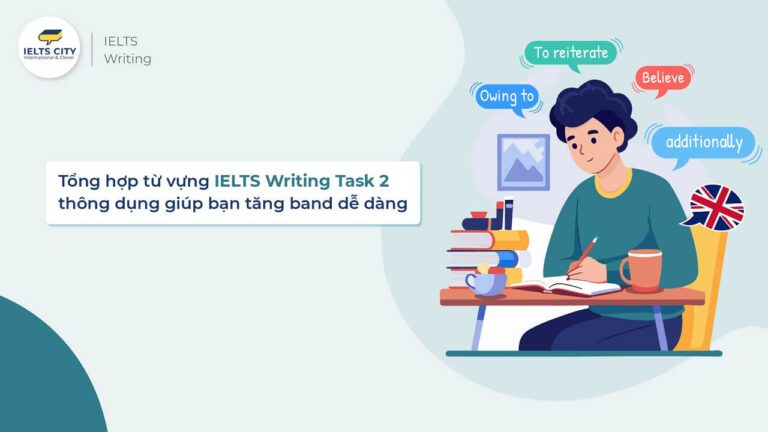Trong 2023, một trong những điều đáng quan tâm nhất có lẽ là sự khủng hoảng kinh tế toàn cầu đang bắt đầu diễn ra trong khoảng cuối 2022. Vì vậy, khả năng cao rằng vấn đề này sẽ được đề cập trong các phần thi IELTS. Để có thể chuẩn bị tốt cho chủ đề này, các bạn hãy cùng IELTS CITY tham khảo các từ vựng tiếng Anh về khủng hoảng kinh tế tại bài viết sau nhé!

Nội dung chính
Toggle1. Khủng hoảng kinh tế tiếng Anh là gì?
Khủng hoảng kinh tế tiếng Anh gọi là Depression hay còn gọi là Economic Crisis.
Khủng hoảng kinh tế được định nghĩa là khi nền kinh tế phải đón nhận một sự sụt giảm trầm trọng kéo dài theo thời gian và gây ảnh hưởng tới tất cả các hoạt động kinh tế.
Trong kinh tế học, khủng hoảng kinh tế được giải thích là một cuộc suy thoái cực đoán kéo dài hơn ba năm hoặc là nguyên nhân dẫn đến sự hao hụt của GDP thực ít nhất 10%
2. Từ vựng thông dụng về chủ đề khủng hoảng kinh tế
- National economy: kinh tế quốc dân
- Obtain cash: rút tiền mặt
- Mortgage: hoạt động tiền tệ
- Originator: người khởi đầu
- Retailer: người bán lẻ
- Non-card instrument: phương tiện thanh toán không dùng tiền mặt
- Insurance: bảo hiểm
- Interest: tiền lãi
- Open cheque: séc mở
- Budget surplus: Thặng dư ngân sách
- Indicator of economic welfare: chỉ tiêu phúc lợi ktế
- Real national income: thu nhập quốc dân thực tế
- Managerial skill: kỹ năng quản lý
- Bailout: Cứu trợ, giải cứu (kinh tế)
- Monetary activities: giá cả phải chăng
- Economic blow: giá trị nền kinh tế bị thổi bay
- Financial crisis: khủng hoảng tài chính
- Stimulus package: gói kích thích kinh tế
- Potential demand: nhu cầu tiềm tàng
- Moderate price: cầm cố , thế nợ
- Global health disaster: thảm họa sức khỏe toàn cầu
- Per capita income: thu nhập bình quân đầu người
- Business slowdown: tốc độ phát triển kinh doanh chậm
- Financial burden: gánh nặng tài chính
- Global recession: suy thoái toàn cầu
- Operating cost: chi phí hoạt động
- Bank bill: Hối phiếu ngân hàng
- Remote banking: dịch vụ ngân hàng từ xa
- Macro-economic: kinh tế vĩ mô
- Remitter: người chuyển tiền
- Preferential duties: thuế ưu đãi
- Basic industries: Những ngành cơ bản
- Break-even: Hòa vốn
- Invoice: hóa đơn
- Payment in arrear: trả tiền chậm
- Planned economy: kinh tế kế hoạch
- Installment: phần trả góp mỗi lần cho tổng số tiền
- Micro-economic: kinh tế vi mô
- Pausing production: tạm dừng sản xuất
- Preferential duties: Chợ đen
- Budget: Ngân sách
- National firms: các công ty quốc gia
- Coronavirus recession: suy thoái kinh tế do dịch bệnh corona
- Market economy: kinh tế thị trường
- Offset: sự bù đắp thiệt hại
- Potential demand: Ngân hàng thanh toán quốc tế
- Turmoil: hỗn loạn
- Outgoing: khoản chi tiêu
- Balance of payment: Cán cân thanh toán
- Rate of economic growth: tốc độ tăng trưởng kinh tế
- Regulation: sự điều tiết
- Remittance: sự chuyển tiền
- On behalf: nhân danh
- Base rate: Lãi suất gốc
- Bank loan: Khoản vay ngân hàng
- Recession: tình trạng suy thoái
- International economic aid: viện trợ Kinh tế quốc tế
- Purchasing power: Giá trị trên sổ sách
- Revenue: thu nhập
- Financial hardship: sự khó khăn về tài chính
- Non-profit: phi lợi nhuận
- Bank credit: Tín dụng ngân hàng
- Mode of payment: phương thức thanh toán
- Hoarding: tích trữ
- The Great Depression: cuộc đại khủng hoảng, đại suy thoái
- Liability: khoản nợ
- Barter: Hàng đổi hàng
- Price-boom: việc giá cả tăng vọt
- Economic panacea: giải cứu toàn bộ nền kinh tế
- On-going global economic crisis: cuộc khủng hoảng kinh tế toàn cầu đang diễn ra
- Budget deficit: Thâm hụt ngân sách
- Bad money drives out good: Đồng tiền xấu đuổi đồng tiền tốt
Đăng ký nhận tư vấn miễn phí
Ưu đãi học phí lên đến 50%
& Cơ hội nhận học bổng trị giá 4.000.000 VNĐ
Đăng ký nhận tư vấn miễn phí
Ưu đãi học phí lên đến 50%
________
3. Từ vựng về các ảnh hưởng của khủng hoảng kinh tế
- Inflation: sự lạm phát
- Stock market crash: thị trường cổ phiếu lao đao
- Economic meltdown: kinh tế tan rã
- Slumping economy: kinh tế tuột dốc
- Economic recession: suy thoái kinh tế
- Layoff: sa thải nhân viên
- Shutdowns: việc phải đóng cửa, tình trạng đóng cửa
- Plunge: Cổ phiếu chìm/ lao dốc
- No income: không có thu nhập
- Pausing production: Tạm dừng sản xuất
- Massive unemployment: Thất nghiệp số lượng lớn
- Bankruptcy: Sự phá sản
4. Các ví dụ tiếng Anh về khủng hoảng kinh tế
- The stock market certainly has its ups and downs, but stock market crashes don’t happen very often.
(Thị trường cổ phiếu tuy có lúc lên lúc xuống, nhưng việc thị trường cổ phiếu lao đao thường sẽ không xảy ra thường xuyên) - Financial experts have always discussed speaking about the economic meltdown.
(Các chuyên gia kinh tế vẫn luôn bàn tán về tình trạng kinh tế tan rã.) - Inflation might spike due to a labor shortage, leading to Economic recession.
(Lạm phát có thể tăng đột biến do thiếu lao động, dẫn đến suy thoái nền kinh tế.) - The organization has devised a simple yet ingenious plan to weather the global recession.
(Tổ chức đã nghĩ ra một kế hoạch đơn giản nhưng khéo léo để vượt qua suy thoái kinh tế toàn cầu.) - Recent economic turmoil has resulted in widespread massive layoffs.
(Những bất ổn kinh tế gần đây đã dẫn đến tình trạng sa thải hàng loạt trên diện rộng.)
5. Các câu hỏi về chủ đề kinh tế trong IELTS
Sau đây, IELTS CITY sẽ tổng hợp tất tần tật các đề thi IELTS speaking và writing mà bạn có thể ứng dụng các kiến thức và từ vựng tiếng Anh về khủng hoảng kinh tế.
5.1. Speaking
Part 2
Describe an economic risk.
You should say:
- What it was like
- Where it took place
- When it took place
And explain your opinion of it.
Part 3
- Which do you think is better for the economy of a country or area, people saving or spending money?
- In your opinion, why do many people derive pleasure from spending money?
- What is the relationship between leisure and the economy?
- Can human beings live without money?
- Which do you think is better for the economy of a country or area, people saving or spending money?
- What do you think about money?
5.2. Writing
Đề 1: Some people feel that the government should control the design of newly constructed buildings in big cities. Others believe those who financed the construction of a building should be free to design it as they fit. Discuss both views and give your opinion.
Đề 2: Families who do not send their children to government-financed schools should not be required to pay taxes that support universal education. To what extent do you agree or disagree with this statement? Give reasons for your answers, and include relevant examples from your own knowledge or experience.
Đề 3: Some people feel governments should control the design of newly constructed buildings in big cities. Others believe those who finance building construction should be free to design it as they see fit. Discuss both views.
Đề 4: It is unacceptable that people who work in certain professions, e.g., finance, media, entertainment, and sport, are paid such high salaries while others, who do more important jobs in society, are underpaid. To what extent do you agree or disagree?
Đề 5: Families who do not send their children to government-financed schools should not be required to pay taxes that support state education. To what extent do you agree or disagree?
Đề 6: Students leave high school without learning how to manage their money. What are the reasons for this? What can be improved in students’ understanding of how to manage their finances?
Đề 7: Governments should support care and finance for retired people. While they should save money when they get older. Discuss both views and give your opinion.
Đề 8: Some people feel that the government should control the design of newly constructed buildings in big cities. Others believe those who financed the building should be free to design it as they see fit. Discuss both views and give your opinion.
Hi vọng rằng với những chia sẻ phía trên của IELTS CITY, các bạn sẽ nắm trọn bộ các từ vựng tiếng Anh về chủ đề khủng hoảng kinh tế để có thể ghi điểm thật tốt khi gặp các chủ đề liên quan đến kinh tế trong kỳ thi IELTS sắp tới của mình nhé. Chúc các bạn luyện thi IELTS thành công!





















